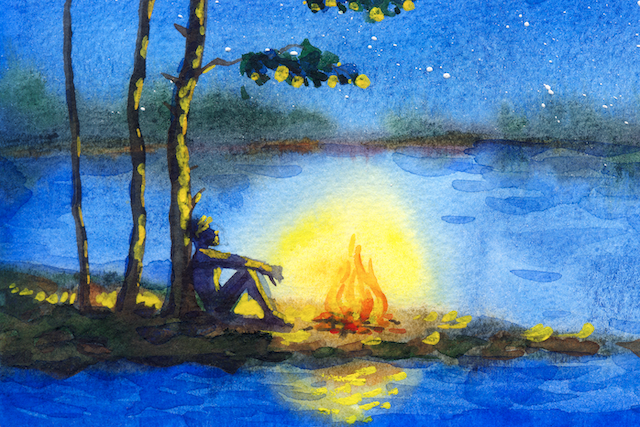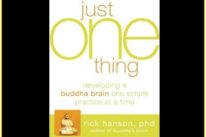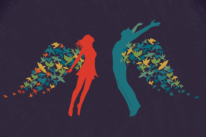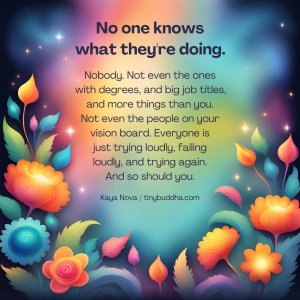
“Every day brings a choice: to practice stress or to practice peace.” ~Joan Borysenko
For five long years during my mid-twenties I was a recluse.
Anxiety so badly affected my life it became impossible for me to venture outside my front door or to interact socially with other people.
Fear and panic would envelop my mind and body, rendering me paralyzed from doing the things I dearly wanted to do. My hopes of being a normal human being lay in tatters. Everything seemed impossible.
Seeing my old friends on Facebook and other people enjoying life, attending parties, finding partners, getting married, having kids, and talking enthusiastically about their travels contributed to my deep reservoir of sadness.
I couldn’t sleep before four o’clock in the morning and would often sleep my afternoons away in order to find a temporary comfort in the evening hours.
The loneliness was overwhelming, the despair was consuming, and the anxiety was like a constantly beating drum, reminding me of time ticking away my hopes, dreams, and desires.
The Japanese have a special word for people who withdraw from the world. I had become a “Hikikomori,” and at the time saw my life as a recluse never ending and maybe even suicide being the eventual outcome.
Fortunately, these grave predictions would never have to be realized, for with the gradual self-cultivation of determination, I began to fight back against my anxiety disorder.
It was extremely difficult at first and there were numerous hurdles, but over a period of a few years I managed to achieve the normalcy I had so badly wanted.
Today I feel as balanced and relaxed as someone who has never known the horrors that inappropriate anxiety and terror can bring. My years as a recluse are long behind me.
I want to share four techniques that I discovered and mention how I used them to vastly reduce the anxiety in my life. Each one can be, and was, practiced in conjunction with the others.
1. Stimulate positive feelings.
For half an hour each day, I began to practice loving-kindness meditation and developed an appreciation for the people and the world around me. I took inspiration for this from a book by the late German Buddhist nun Ayya Khema called Being Nobody, Going Nowhere.
This stimulated parts of my brain different to those that activate the anxiety response. By doing this I was able strengthen mental muscles related to relaxation and happiness. This also seemed to lessen the space in which my anxiety was able to maneuver, thereby reducing its strength and effectiveness.
I knew the development of love and acceptance for myself was also crucial to my healing. There’s not a lot else that is more disconcerting and destabilizing than a mind filled with self-hatred or blame.
2. Bathe in discomfort.
We are not very good at accepting discomfort. Whether it’s physically or mentally, as soon as an uncomfortable feeling arises we instinctively try to get away from it. The more we do this, the more our levels of intolerance increase. This can become very pronounced in the avoidance tactics most anxiety sufferers evolve.
The solution for me was to develop a gentle acceptance of discomfort, whether it was an itch on my leg or the unpleasant feelings of apprehension. I slowed down my conscious response to the feeling and observed it for a little while without trying to fix it or run away from it.
I bathed in the discomfort, even when I was filled with horrendous fear, rather than immediately trying to find distractions such as food, TV, Valium, or alcohol. It was very hard to begin with but I kept going, kept trying, kept persisting.
By doing this I found I was able to handle discomfort more effectively and appropriately. Fear and panic began to slowly decrease as my mental awareness of the nature of the feelings becomes more refined.
3. Study the anxiety.
It’s important when dealing with anxiety to study what you are thinking and what leads to increased mental tension. Humans are very imaginative, and while this has enabled us to survive and prosper as a species, it has also left us at the mercy of our inner-creativity.
I began to study my anxiety and my thoughts. I constantly questioned whether the fear of impending disaster was legitimate or not. Whether it was likely or unlikely to actually happen? Was it a sensible worry to engage in on that particular day? Or could it have been postponed until the following day?
If so, then I left the worry for the next day and mentally compartmentalized it so it would not encroach on my then present reality. In the meantime, I used my energies to engage in activities which I believed would positively develop me as a person, however small and insignificant they seemed at the time.
4. Distract your creative mind.
As mentioned previously, the mind is great at imagining worst-case scenarios. Inappropriate anxiety and fear are fueled by the creative part of the human brain. If an anxiety sufferer allows this part to run free then all havoc can break loose.
When fear was present in my mind, which was very often, I began to realize it was important to try and switch my thoughts away from my creative and emotional mind, and instead into the rational and logical realm of my brain.
This effectively reduced anxiety periods in a surprisingly short amount of time by engaging reason over raw emotion.
I managed to do this by focusing my complete attention on to logic-based puzzles or games. I did various things including reciting the alphabet backwards, solving a mathematical problem, memorizing 10 foreign language words within ten minutes, or trying to comprehend a riddle.
Relaxation is Attainable
Nowadays I live in a foreign country with a woman I love and enthusiastically engage in a job I find highly rewarding. When I look back on the man I once was, sitting alone in a bedroom for years on end, without a shred of hope or happiness, I can’t help but feel immense love and compassion for that person.
Life is not easy and when you get stuck in a rut, things can quickly become overwhelming and seemingly impossible to escape. An anxiety disorder can disfigure the sense of reality one has and render the world a terribly frightening and cold place.
However, it’s important to remember that no matter how bad the fear may feel, or how much of a stranglehold anxiety seems to have on your life, things can get better. With a determined spirit, you can move toward a more relaxed, healthier, and happier way of living.
This will not only benefit you but also those who love you the most.
About Stephen Joseph
Stephen Joseph is the relaxed mind behind Outsmart Anxiety. A website devoted to helping anxiety sufferers find ways to reduce the fear, panic, and tension in their lives. Join the newsletter for frequent anxiety-busting tips and techniques.













 Though I run this site, it is not mine. It's ours. It's not about me. It's about us. Your stories and your wisdom are just as meaningful as mine.
Though I run this site, it is not mine. It's ours. It's not about me. It's about us. Your stories and your wisdom are just as meaningful as mine. 